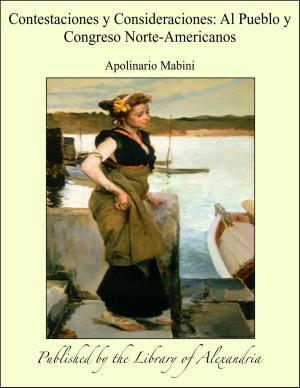| Author: | George Payne Rainsford James | ISBN: | 9781465607249 |
| Publisher: | Library of Alexandria | Publication: | March 8, 2015 |
| Imprint: | Language: | English |
| Author: | George Payne Rainsford James |
| ISBN: | 9781465607249 |
| Publisher: | Library of Alexandria |
| Publication: | March 8, 2015 |
| Imprint: | |
| Language: | English |
It may be very well in most cases to plunge, according to the rule of the Latin poet, into the middle of things. It may be very well even, according to the recommendation of Count Antoine Hamilton, to 'begin with the beginning.' But there are other cases where there may be antecedents to the actual story, which require to be known before the tale itself is rightly comprehended. With this view, then, I will give one short scene not strictly attached to that which is to follow, ere I proceed with my history. In a small high room of the oldest part of St. John's College, Cambridge, in a warm and glowing day of the early spring, and at about seven o'clock in the morning, there sat a young man with his cheek leaning on his hand, and his eyes fixed upon the page of an open book. There were many others closed and unclosed upon the table around him, as well as various pieces of paper, traced with every sort of curious figure which geometrical science ever discovered or measured. The page, too, on which his eyes were bent, was well nigh as full of ciphers as of words, and it was evident, from everything around, that the studies of the tenant of that chamber were of a very abstruse character. And yet to gaze at him as he sits there, and to consider attentively the lines of the face, and the development of the organs of the head, the physiognomist or phrenologist would, at once pronounce that, although by no means wanting in any of the powers of mind, that young man was by nature disposed to seek the pleasures of imagination rather than the dry and less exciting, though more satisfactory, results of science. There were some slight indications, too, about his room, of such tastes and propensities. In a wine-glass, half filled with water, were some early flowers, so arranged that every hue gained additional beauty from that with which it was contrasted; a flute and some music lay upon a distant table; one window, which looked towards the gardens, and through which came the song of birds and the fragrant breath of the fresh fields, was thrown wide open; while another, which looked towards courts and buildings, was closed, and had the curtains drawn. Nevertheless, had any eye watched him since he rose, it would have found that from the hour of five he had remained intent upon the problems before him, suffering not a thought to wander, neither rising from the table, nor turning his eyes even for a moment to the worshipped beauty of external nature. The air came in gently from without, and fanned his cheek, and waved the curls of his dark hair; the smell of the flowers was wafted to the sense; the song of the bird sounded melodious in his ear; but not the breeze, nor the odour, nor the lay called off his attention from the dry and heavy task before him. His cheek was pale with thought, his fine eyes looked oppressed with study, though still bright; and the broad expansive brow ached with the weary labours of many a day and night: labours to which he saw no end, from which he hardly hoped to obtain any very great result. Tall and manly in person, with limbs apparently formed for robust exercises, and a mind fitted for the enjoyment of every refined and graceful pleasure, he had chained down the body and, I may almost add, the spirit, to the hard captivity of intense study, in the hope some day of making himself a great name, and recovering from the grasp of fortune that wealth and station which had been the inheritance of his ancestors.
It may be very well in most cases to plunge, according to the rule of the Latin poet, into the middle of things. It may be very well even, according to the recommendation of Count Antoine Hamilton, to 'begin with the beginning.' But there are other cases where there may be antecedents to the actual story, which require to be known before the tale itself is rightly comprehended. With this view, then, I will give one short scene not strictly attached to that which is to follow, ere I proceed with my history. In a small high room of the oldest part of St. John's College, Cambridge, in a warm and glowing day of the early spring, and at about seven o'clock in the morning, there sat a young man with his cheek leaning on his hand, and his eyes fixed upon the page of an open book. There were many others closed and unclosed upon the table around him, as well as various pieces of paper, traced with every sort of curious figure which geometrical science ever discovered or measured. The page, too, on which his eyes were bent, was well nigh as full of ciphers as of words, and it was evident, from everything around, that the studies of the tenant of that chamber were of a very abstruse character. And yet to gaze at him as he sits there, and to consider attentively the lines of the face, and the development of the organs of the head, the physiognomist or phrenologist would, at once pronounce that, although by no means wanting in any of the powers of mind, that young man was by nature disposed to seek the pleasures of imagination rather than the dry and less exciting, though more satisfactory, results of science. There were some slight indications, too, about his room, of such tastes and propensities. In a wine-glass, half filled with water, were some early flowers, so arranged that every hue gained additional beauty from that with which it was contrasted; a flute and some music lay upon a distant table; one window, which looked towards the gardens, and through which came the song of birds and the fragrant breath of the fresh fields, was thrown wide open; while another, which looked towards courts and buildings, was closed, and had the curtains drawn. Nevertheless, had any eye watched him since he rose, it would have found that from the hour of five he had remained intent upon the problems before him, suffering not a thought to wander, neither rising from the table, nor turning his eyes even for a moment to the worshipped beauty of external nature. The air came in gently from without, and fanned his cheek, and waved the curls of his dark hair; the smell of the flowers was wafted to the sense; the song of the bird sounded melodious in his ear; but not the breeze, nor the odour, nor the lay called off his attention from the dry and heavy task before him. His cheek was pale with thought, his fine eyes looked oppressed with study, though still bright; and the broad expansive brow ached with the weary labours of many a day and night: labours to which he saw no end, from which he hardly hoped to obtain any very great result. Tall and manly in person, with limbs apparently formed for robust exercises, and a mind fitted for the enjoyment of every refined and graceful pleasure, he had chained down the body and, I may almost add, the spirit, to the hard captivity of intense study, in the hope some day of making himself a great name, and recovering from the grasp of fortune that wealth and station which had been the inheritance of his ancestors.















